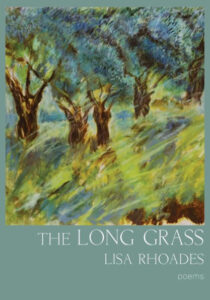Seasons and calendars never fit together perfectly. As farmers say about winter, as the days get longer, the nights get colder. The change of seasons sets the pace of “The Long Grass,” a keen-eyed, memorable volume of poems by Lisa Rhoades.
Rhoades has traveled from the Mississippi Valley – she grew up in Missouri and studied at LSU – to an unreal city. She lives on the North Shore of Staten Island with her family, on a ridge with views of the harbor’s gray water and Manhattan’s towers. From that vantage point, Rhoades has looked deeply into different worlds. Many of her poems are set in New York City, many revolve around the Greek goddess Demeter, a persona through whom Rhoades speaks, and the juxtaposition fits.

Demeter was the patroness of farming and the harvest, but she is best remembered for a myth of violence and persisting love. Her daughter Persephone was carried off to the underworld by Hades. Searching for Persephone, Demeter ceased to keep the seasons moving in their courses, visiting winter upon the world. Only after she found her daughter, and won her return from Hades for six months of every year, was the normal path of life renewed.

The myth of Demeter and Persephone speaks about child-rearing, mother-love, the cadence of routine, and the changing phases of human life – the themes that cycle through these poems. The passage that Demeter made between the underworld and the living world – in this book, “the bright world” – finds an ironic, fitting parallel in Rhoades’ poetry: it is reflected in the daily commute between a doubtful city and her own home and garden.
Rhoades writes of the dubious beggars and street preachers who bedevil commuters. At the end of one poem, “In the Bright World, Demeter Takes the Downtown Six,” she meditates about a set of panhandlers, to whom she regularly gives change: “They find the cardboard / outside of the bodegas, or liquor stores, or groceries. / But what about the markers? The thick permanent ones / Aren’t cheap.”
Irony has many levels here – some wary, some humorous. There is the commuter’s quiet decision to have a cup of oatmeal today and a doughnut tomorrow. The same commuter, standing in the crowd at the terminal doors, can pick out a singular figure among the deckhands. “She remembers when Charon was young / and not mad, the silky blue of his eyes.” As once he ferried souls across the River Styx, so now he oversees the Staten Island Ferry.
Rhoades offers the ferry a valediction.
“Some days my dead crowd in, filling my coat pockets
with the smooth stones of their names.
Gone. Gone.
I carry them with me, bundled up
and shuffling onto a boat, setting out
as if on a journey . . . .
“Sit down and read with me,
doze, or crochet, watch
the water behind the boat knit shut.”
Some of Rhoades’ poems have sharp edges. They put a honed modern edge on classical myth and eternal apprehension:
“He told her she didn’t deserve
better. He picked her out from the larger group
and followed her from school . . . .
‘With his horses Hades snatched her screaming
into the misty gloom.’
She was slut-shamed by her friends. It was all her fault.”
More often, Rhoades writes about any mother – or Demeter, or herself – watching a daughter grow. The baby nursing at the breast, looking up into her mother’s eyes, becomes the teenager who comes home from camp with a self-administered tattoo.
“The girls gallop. They are horses.
They run the field of red clover
and rye – inflorescence
above, a sweetness within . . . .
By summer’s end they are bored and tan.
By summer’s end they are young women.”
This book is Rhoades’ third volume of poetry. She closes with an acknowledgment of human limits and an affirmation of the confidence of new generations – the strength of new life.
“She’s writing a poem
in which the mother is the earth goddess.
‘So I’ve got some power here.’
The daughter responds, laughing and kissing
her mother’s brow. . . .
The mother is saying, ‘you will suffer
and be lost’
and the daughter hears
‘I am a goddess too.’”
“The Long Grass.” By Lisa Rhoades. Saint Julian Press (Houston, Texas), 2020. 88 pages. $16.00.
Allen Boyer is Book Editor of HottyToddy. A native of Oxford, he himself writes on the Staten Island Ferry. A previous version of this review was published in the Phi Beta Kappa Key Reporter.

